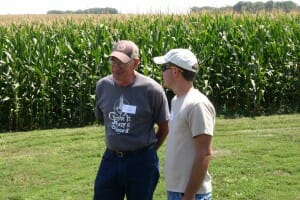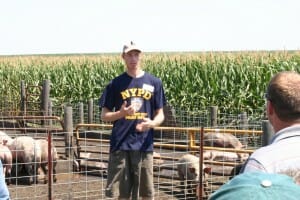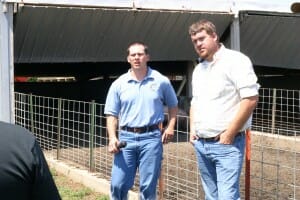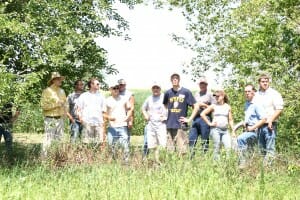Integrating Niche Pork, Beef, & Crops…all from a beginner’s perspective. (Part 1 of 2: Niche Pork with Niman Ranch)
Drew & Dean Lietz
Alta, August 1, 2012
Beginning farmer and PFI Savings Incentive Program member Drew Lietz opened his new Niman Ranch-oriented start-to-finish hog operation to questions and comments from a group of almost 30 on yet another hot summer day. After a lunch featuring Niman Ranch hot dogs Drew outlined his operation and received considerable input from field day attendees. Included were Niman field reps Phillip Kramer (North central Iowa) and Jim Wallace (Western Iowa), as well as PFI member Niman producers on-hand such as Dan Wilson (Paullina).
Attendees learned how Niman works with pork farmers of all sizes, but the system works best with 200 head loads of market pigs and farrow operations of at least 50 sows. Opportunities exist for smaller producers to aggregate production and load-outs to get in.
Niman protocols include no antibiotics, hormones, or other growth promoters; all vegetarian diets; and meeting Niman’s husbandry standards. Because Niman Ranch markets fresh pork, never frozen, thorough communication between their producers, field reps, marketing staff, and processing facility in Sioux Center, Iowa is essential.

Beginning farmer Nate Anderson (Cherokee) and his Savings Incentive Program mentor, Niman producer Dan Wilson (Paullina) consider pastured farrowing options
Due to market demand Niman Ranch is always looking for more farmers. Niman customers include high-end stores like Whole Foods Grocery and white table cloth type restaurants. They are also seeking new farmers because they don’t want to see the average age of their farmers, now in the mid to upper fifties, to continue to rise like other sectors of Iowa farmers.
“Where does a guy go to get information to know how to raise hogs – nutrition, wellness, management?” asked aspiring hog farmer Nathan Anderson, a PFI Savings Incentive Program member. “We are all available to help producers with all the questions they may have, we have a veterinarian on staff, and offer consulting on all parts of the process” said Jim Wallace of Niman Ranch.
Niman rep Philip Kramer says the difference between their more hands-on, traditional production methods and conventional methods keeps them scrambling to link enough producers to meet demand. “I went to school for swine nutrition, and there was one or two other guys in my graduating class that had any idea how to use a scoop shovel and clean outdoor hog sheds.”
However, the Niman system is organized to support the change, or the startup for a beginner, to traditional practices;
• They set a floor price that shifts with the market price of feed to safeguard farmers and prevent prices below the cost of production.
• They will go to a banker with producers to explain that growing pork for Niman ranch is secure.
• Their field reps not only audit but provide guidance and support through the process.
• Farmers are partially reimbursed for shipping costs to send pork to an approved facility.
Farrowing
For Niman protocols, farrowing pens must allow the mothers to get up and turn around within their crates, and either allow free-will exit from the crates, or daily open/closed setups.
Drew intends to breed his gilts with boars this year, introducing them to the gilts a couple months prior. “I guess I figured that as the natural way to go,” reflects Drew.
Best success can be achieved when a farm has a closed-herd of sows to keep good mothering genetics on the farm year after year. “Get the floppers off the farm to market,” says Phillip Kramer.
An old barn on the Lietz farm is in great condition allowing Drew and Dean to build 20 pens for sows to farrow. “With a little foam insulation, and a few new window panes, you can patch this place up and put a heater in it if you had to,” remarked Jim Wallace.
“I love to pasture farrow my hogs. I do four cycles each year, and when I started by the time I cleaned the farrowing house the third time, I got tired and put them out to pasture.” Said PFI member and Niman producer Dan Wilson.
Timing is essential to prevent mortality of pigs. “My father had a rule that we would NEVER pasture farrow from July 4th to August 15th. Heat stresses are too great this time of year…especially this year.” Said Wilson.
Previously A-frame or English style huts were sold by any farm service Co-op in Iowa, but now can be made on the farm. Materials for 4.5 by 7ft A-Frames are about $200 and 6 by 8 ft English Huts are $350.
Drew and Dean are wondering if pasture farrowing will be possible in high winds and cold spring evenings. “40 degree weather is harder on the farmer than on the sows,” chuckles Dan Wilson, “They just burrow down deeper to keep warm.” Dan also adds more bedding and closes up the huts a bit more.
Dan has pasture farrowed for decades and shares these tips:
- Orient the huts to the southeast so they capture early morning sun.
- Choose bedding like oat straw or ground corn cobs, NOT corn stalks or other materials that can lacerate the navels of piglets and cause them to bleed to death.
- Rotate pasture, corn, soybeans, small grains, and alfalfa to break the three year worm cycles.
- Two strand electric fence, one at 6 to 8 inches and one at 18 inches to two feet control the pigs, but keep the charge below 9,000 Volts, which can kill piglets.
All this specific care matters for Niman producers, who can get bonuses for exceptional meat quality. Each farmer is individually identified in company records and with a loin tattoo that is actually seen by end-users, who can contact the company to find who produced their piece of Iowa pork.
In another nod to farm diversity, Drew and Dean Lietz are slowly expanding a beef herd as time and resources allow. Niman Ranch markets niche beef, with another set of special protocols, but typically only for their existing hog producers because it is still a smaller sector of their product mix. Questions can be directed to Niman’s beef representative, Mark Gayhart, at 262.308.2246. Other Niman products include lamb, poultry, and eggs.
In the next Lietz Field Day installment: Experts from Titan Pro discuss herbicide tolerance and comprehensive weed management strategies.



